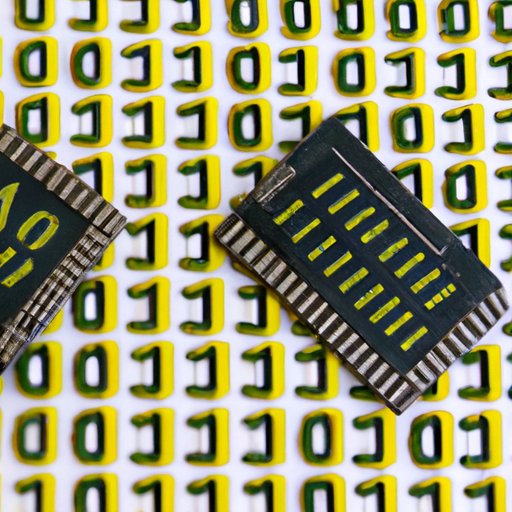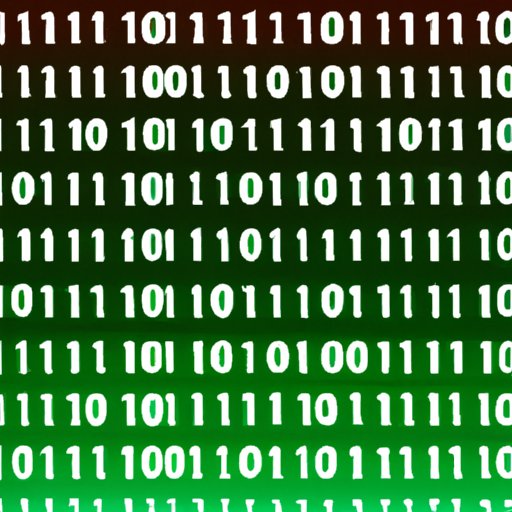Introduction
Binary numbers are a fundamental aspect of computer science. They are integral to understanding how computers operate and are used to create complex programs and store and process data. The concept of binary numbers has been around since ancient times, but its importance in computer science was not realized until the mid-20th century. In this article, we will explore why binary numbers are important in computer science and how they are used to create complex programs, store and process data, and aid in programming languages.
What are Binary Numbers?
Binary numbers are numbers that are represented by two symbols: 0 and 1. These numbers can be used to represent any number, from 0 to infinity. For example, the binary number 1101 is equivalent to the decimal number 13. Binary numbers are the basis for all computer operations, as computers only understand two states: on and off (represented by 0 and 1).
Overview of Their Role in Computer Science
Binary numbers play an essential role in computer science. They are used to create complex programs, store and process data, and aid in programming languages. Binary numbers are used to encode data, represent instructions, and communicate information between computers. They are also used to perform arithmetic operations such as addition, subtraction, multiplication, and division.

How Binary Numbers are Used to Create Complex Programs
Binary numbers are used to create complex programs. This is done through the use of bitwise operators, which allow programmers to manipulate bits to create programs. Bitwise operators include AND, OR, NOT, XOR, and SHIFT. They are used to perform logical operations on binary numbers to create more complex programs.
Binary numbers are also used to create instruction sets, which are sequences of instructions that tell the computer what to do. Instruction sets are written in assembly language, which is a low-level language that uses binary numbers to represent instructions. Assembly language is used to create programs that are optimized for speed and efficiency.

Why Binary Numbers are Essential for Memory Storage and Processing
Binary numbers are essential for memory storage and processing. They are used to encode data, which is the process of converting information into a form that can be stored in memory. Binary numbers are also used to represent instructions, which are commands that tell the computer what to do. Instructions are encoded in binary numbers and stored in memory.
How Binary Numbers Aid in Programming Languages
Binary numbers are also used to create high-level programming languages, such as C++ and Java. High-level languages are designed to make it easier for humans to write programs. They are compiled into assembly language, which is then converted into binary numbers. Assembly language is a low-level language that uses binary numbers to represent instructions.

The Advantages of Binary Numbers in Data Representation
Binary numbers offer several advantages when it comes to data representation. They are more efficient than other forms of data representation, as they require less space to store information. They can also be easily converted from one form to another, which makes them ideal for storing and transferring data.
Understanding Binary Arithmetic and Its Significance in Computer Science
Binary numbers are also used to perform arithmetic operations. Binary arithmetic operations include addition, subtraction, multiplication, and division. These operations are essential for computer operations, as they allow computers to process data quickly and accurately.

Examining the Benefits of Binary Numbers in Network Communications
Binary numbers are also beneficial for network communications. They can be used for error detection and correction, which ensures that data is transmitted correctly. Binary numbers can also be used for data compression, which reduces the amount of data that needs to be transmitted.
Conclusion
Binary numbers are an essential part of computer science. They are used to create complex programs, store and process data, and aid in programming languages. Binary numbers offer several advantages, including efficient storage and easy conversion. They are also used to perform arithmetic operations and for network communications. In summary, binary numbers are vital for computer science, as they are the foundation upon which computers operate.
(Note: Is this article not meeting your expectations? Do you have knowledge or insights to share? Unlock new opportunities and expand your reach by joining our authors team. Click Registration to join us and share your expertise with our readers.)
